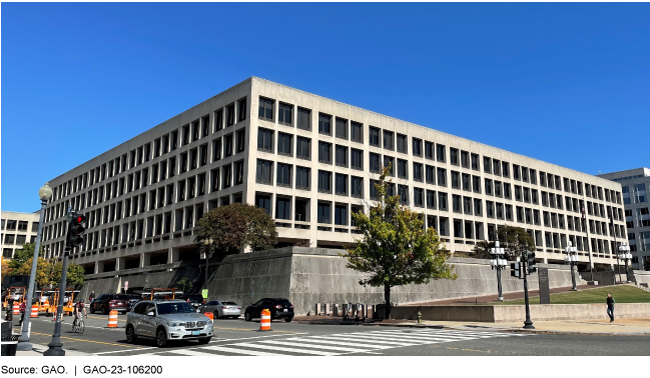Federal Real Property: Preliminary Results Show Federal Buildings Remain Underutilized Due to Longstanding Challenges and Increased Telework
Fast Facts
The federal government's office spaces cost billions every year to lease, operate, and maintain. Even before the pandemic, agencies struggled to determine how much office space they actually needed.
In this testimony, we discuss the 21.5 million square feet of usable office space—conference rooms, team rooms, and offices—in the headquarters buildings of 24 agencies. During 3 weeks in January, February, and March of this year, 17 agencies' buildings were at 25% capacity or less.
We also discuss the financial, environmental, and opportunity costs of underused office space and the challenges to addressing this issue, according to agency officials.
Example of an Agency Headquarters Building: Department of Labor

Highlights
What GAO Found
Federal agencies have long struggled to determine how much office space they needed to fulfill their missions efficiently. Retaining excess and underutilized space is one of the main reasons that federal real property management has remained on GAO's High-Risk List since 2003. Seventeen of the 24 federal agencies in GAO's review used an estimated average 25 percent or less of their headquarters buildings' capacity in a three-week sample period across January, February, and March of 2023. On the higher range, agencies used an estimated 39 to 49 percent of the capacity of their headquarters on average.
Quartile Weekly Utilization Estimated Averages of Federal Headquarters Buildings across Three-Week Sample (One week in each of January, February, and March 2023)

Underutilized office space has financial and environmental costs. Federal agencies spend about $2 billion a year to operate and maintain federal office buildings regardless of the buildings' utilization. In addition, agencies spend about $5 billion annually to lease office buildings. Any reduction in office space could reduce these costs. Office buildings also have environmental costs that could be lowered with better utilization. For example, GSA renovated and reduced its current agency real estate footprint, which helped reduce energy consumption and costs.
Agency real property officials identified challenges to increasing their headquarters building utilization.
- Funding. Additional budget resources are needed to reconfigure existing space to increase utilization and support a hybrid work environment.
- Potential policy changes. Concerns about the future of in-office attendance policies and habits have caused a reluctance to reduce headquarters space.
- Standards. There are no standards for how federal agencies should measure utilization to guide agency efforts.
- Culture. Agency leaders can be reluctant to share headquarters space among inner-agency components or other agencies.
Why GAO Did This Study
The federal government owns over 500 million square feet of office space that costs billions annually. As the country emerges from the pandemic, the federal government has a unique opportunity to reconsider how much and what type of office space it needs.
This testimony discusses the preliminary results of an ongoing GAO review that (1) assesses the extent to which agencies utilized their headquarters buildings in selected weeks of early 2023; (2) describes the costs of underutilized federal office space; and (3) discusses challenges agency officials identified to increasing the utilization of their headquarters buildings.
GAO collected building size and attendance data from 24 federal agencies for one week in January, February, and March of 2023. GAO calculated the capacity of each headquarters building by dividing the size of the building by a per-person benchmark used by the General Services Administration. GAO then calculated utilization for each building by dividing the in-office attendance for the sample period by the capacity for each building. The percentages in this testimony are preliminary estimates based on ongoing work and are subject to change.
The General Services Administration and the Department of Veterans Affairs provided comments, which are reprinted in the appendixes.
For more information, contact David Marroni at (202) 512-2834 or MarroniD@gao.gov.
